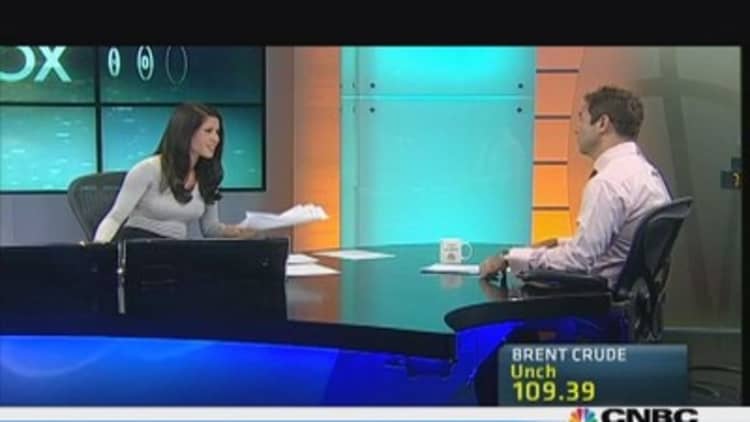
China's tightly-controlled yuan traded at a record high against the U.S. dollar on Tuesday and unprecedented demand has made it stand out as one of the world's most attractive currencies, analysts told CNBC.
Following strong trade data published over the weekend, the People's Bank of China (PBOC) has been aggressively fixing the yuan's daily mid-point at its highest levels since the 2005 currency revaluation.
On Tuesday, the yuan was fixed at 6.1114 to the dollar and rose to a fresh record high of 6.0703. The central bank controls yuan trading by limiting its movement to 1 percent on either side of a daily-fixed mid-point.
"To my mind this [the yuan] is out on its own as the best currency on the planet," Stuart Oakley, managing director of Asian currency trading at Nomura, told CNBC Asia's Squawk Box on Tuesday.
(Read more: Yuan now second most used currency in trade finance)
Aside from more positive data out of the economy and signs that reform plans are gaining traction, Oakley told CNBC that another more important driver underlies yuan strength.
"The real issue for the yuan doesn't so much lie in the data actually. It lies in the unprecedented structural demand from sovereigns, corporates and from retail investors around the world, because relative to any other currency, it's out on its own," he added
China saw its largest trade surplus in more than four years in November, thanks to an acceleration of exports and slowing imports. The positive data has boosted long-running hopes that the Chinese central bank might feel more comfortable relaxing its grip on the yuan, a move that many analysts say could pave the way for strong gains.
Nomura's Oakley said the PBOC's latest move suggests that action is imminent: "I think the band will be widened imminently it could be this week or in a month," he said.
However, even if there is no immediate action Oakley said traders would still benefit from being short U.S. dollars and long the yuan.
"You're still making money whether they widen the band or not as it's all about the flows," he added.
The yuan has been one of Asia's strongest performing currencies this year, up around 2.53 percent against the dollar year to date. In contrast, the Japanese yen is down 20 percent against the dollar, while the Indian rupee is down 11.17 percent.
(Read more: Singapore and Hong Kong exchanges team up on yuan)
And last week the Society for Worldwide Interbank Financial Telecommunication (SWIFT) reported that the yuan had overtaken the euro to become the second most used currency in international trade finance worldwide, after the dollar.

Other analysts also told CNBC they were bullish on the yuan, citing a number of positive macro-economic tailwinds set to give the currency a boost.
"It's an important part of their rebalancing," said Jonathan Webb, head of FX strategy at Jefferies Bache, referring to China's rebalancing of its economy from an investment led- to a consumption one.
"The third plenum was very important. We saw some huge reforms, people were quite surprised at how radical it was, and part of that adjustment is going to be a stronger yuan. It's one of our key recommendations for next year," he added.
Meanwhile, Ray Attrill, co-head of FX strategy at National Australia Bank, also said recent moves by the bank to set the mid-point lower were significant.
"We've seen two days of single-big-figure moves. That looks to me to be somewhat significant. It does say that the authorities... are still intent on allowing the currency to appreciate. I think that ties very much in with the hints that we are going to see band widening at a more market determined exchange rate," he said.
(Read more: Yuan moves one step closer to global currency status)
However, not everyone is convinced that the yuan will rally once the central bank opens it up to market forces.
Lombard Street Research published a note last month that argued China's reform plan would knock the yuan off its appreciation path over the next 12-18 months.
Allowing capital to flow more freely into and out of China, they said, could prompt domestic investors to diversify through purchasing foreign assets, putting downward pressure on the yuan.
— By CNBC's Katie Holliday: Follow her on Twitter @hollidaykatie


